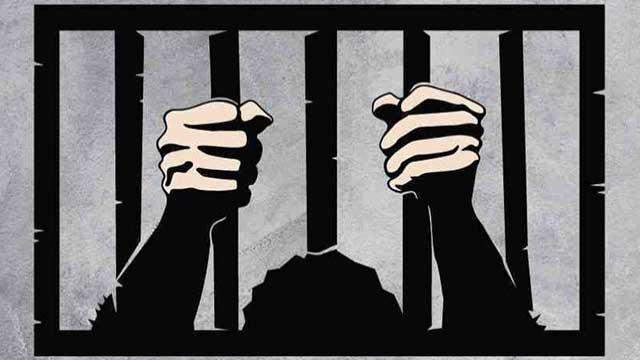Convictions of leaders and activists of the main opposition Bangladesh Nationalist Party and its associate bodies have significantly increased in recent weeks ahead of the January 7 national election.
Most of the convictions of the BNP leaders and activists in the cases are based on the depositions of police members, prompting lawyers and experts to raise doubts about a fair trial in the cases.
The disposal of what the BNP called political cases intensified after prime minister Sheikh Hasina, at a programme on October 21, asked lawyers to take prompt measures for quick disposal of the cases related to arson attacks.
Since the prime minister’s instructions, over 800 leaders and activists of the BNP have been convicted in different violence cases across the country, according to lawyers and court officials.
At least 42 BNP people and a Jamaat-e-Islami leader were convicted on Monday in four cases filed with the capital’s Tejgaon, Kamrangirchar, Gulshan, and Paltan police stations.
With this, 961 opposition political leaders and activists, mostly from the BNP, were awarded jail terms in 62 cases by different courts in Dhaka between August 1 and December 11.
At least 248 BNP people were awarded different terms of imprisonment in the past 11 days of the current month in 20 cases, while 615 BNP people were jailed in November in 33 cases, 71 BNP people in October in six cases, and 27 people were jailed in three cases in August.
‘I am astonished after seeing the very quick and overnight completion of the cases against the opposition, including BNP people, in recent times, like Aladdin’s lamp,’ said ZI Khan Panna, a noted Supreme Court lawyer.
‘Like the BNP’s cases, I urge the authorities for quick completion of all pending cases; otherwise, there will be questions about the speedy trial,’ he said.
Most of the cases that ended in the conviction of opposition people were filed by the police or supporters of the ruling Awami League between 2013 and 2018.
BNP termed the cases filed mostly under the Special Powers Act, the Explosive Substances Act, and the Penal Code, among others, as ‘politically motivated.’
‘The government gave a political task to the lower courts to punish the BNP leaders and activists quickly in the false and politically motivated cases, and they were performing illegal duties,’ said BNP’s central leader and lawyer, Masud Ahmed Talukder.
The trial is going on at an abnormal speed against the BNP people, and they are failing to get justice from the courts, he alleged.
BNP leaders and lawyers alleged that the BNP people, who can play a direct and indirect role in the field movement and politics, were being punished in political cases, aiming to create a vacuum in the BNP’s politics and keep them away from the election.
BNP has been enforcing hartal and blockades since their thwarted grand rally in Dhaka on October 28 amid a crackdown on the party, the filing of barrages of cases, and frequent verdicts on leaders and activists in old cases.
Even a number of dead BNP people were implicated in some recent cases filed by the police on charges of violence, while several courts also awarded punishment to several dead BNP people in pending cases.
Lawyer Masud Ahmed said the police themselves are plaintiffs and witnesses in these cases, and there are hardly any independent witnesses in the cases.
‘The convictions are given based on the deposition of police only, while defence lawyers are also not getting scope to defend their clients. It is unprecedented,’ he said.
Lawyer ZI Khan, also chairperson of Ain o Salish Kendra, said that the conviction of the opposition party based only on police depositions would not be upheld if the verdicts were challenged in the higher courts.
‘If there was a rule of law in the country these things would not happen. Unfortunately, no government pays attention to the rule of law. No trial can take place without giving a person the opportunity to defend himself. It is a violation of the rule of law,’ he said.
Court sources said that on November 20, a Dhaka metropolitan magistrate court sentenced 25 BNP people, including party central leader Habibub-Nabi-Khan Sohel, to 30 months in jail in a case filed with the Paltan police station on charges of violence in 2017.
The court delivered the verdict against the BNP people after examining only six of 25 witnesses. All six witnesses, including the plaintiff in the case, were members of the police, and there were no independent witnesses.
The case was completed within 15 working days after the start of the trial, said Faruk Hossain, one of the defence lawyers.
Iltutmish Saudagar, the lawyer of BNP leader Abdul Quader Bhuiyan Jewel, said that a Dhaka court convicted Jewel in a violence case in November, in which only five out of 13 witnesses testified—all members of the police.
In another case against Jewel, only 5 out of 29 prosecution witnesses testified before the court. All five were also police members, and there was no independent witness to testify in the case.
On November 30, a magistrate court sentenced 11 BNP people, including Juba Dal leader Rajab Ali Pintu, to 30 months imprisonment in a case filed with Kotwali police station in the capital on charges of vandalising vehicles in 2018.
Defence lawyer Zillur Rahman said five witnesses testified before the court in the case, all of whom were police members.
The additional public prosecutor of Dhaka Metropolitan Sessions Judge Court, Taposh Kumar Pal, denied the allegation of hastening the trial.
‘There is no violation of the law for the conviction based on police depositions,’ he said.-New Age





